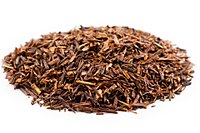
Photo from wikipedia
Plucked tea leaves can be processed into black tea (Camellia sinensis), which is rich in health-promoting molecules, including flavonoid antioxidants. During black tea processing, theaflavins (TFs) and thearubigins (TRs) are… Click to show full abstract
Plucked tea leaves can be processed into black tea (Camellia sinensis), which is rich in health-promoting molecules, including flavonoid antioxidants. During black tea processing, theaflavins (TFs) and thearubigins (TRs) are generated via the successive oxidation of catechins by endogenous polyphenol oxidase (PPO)- or peroxidase (POD)-mediated reactions. This process must be well controlled to achieve the proper TF/TR ratio, which is an important quality parameter of the tea beverage. However, little is known about the POD/PPO catalyzed TF formation process at the molecular genetic level. Here, we identified and characterized the POD genes responsible for TF production in tea. Genome-wide analysis of POD/PPO family genes, metabolite profiling, and expression analysis of PPO/POD genes in tea leaves enabled us to select several PPO/POD genes potentially involved in TF production. Differential gene expression in plant tissues and enzyme activity in several tea varieties traditionally used for processing of various beverage types indicate that black tea processing primarily depends on PPO/POD activity. Among these POD/PPO genes, the POD CsGPX3 is involved in the generation of TFs during black tea processing. The capacity of PPO/POD-catalysed TF production is potentially used for controlling catechin oxidation during black tea processing and could be used to create molecular markers for breeding of tea plant varieties suitable for the production of high-quality black tea beverages.
Journal Title: Food research international
Year Published: 2020
Link to full text (if available)
Share on Social Media: Sign Up to like & get
recommendations!